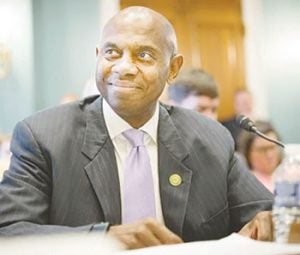‘Capitol’ presentation
Published 10:42 am Monday, August 7, 2017
WASHINGTON, DC – A local voice rang out within the halls of Congress here recently.
Roanoke Electric Co-op CEO Curtis Wynn testified before the House Committee on Agriculture on “The State of Infrastructure in Rural America.”
“It was a privilege and my pleasure to offer suggestions to the bipartisan committee, as they ponder options to make badly needed investments in rural infrastructure,” said Wynn, who also serves as vice president of the National Rural Electric Cooperative Association’s (NRECA) board of directors. “I hope that my testimony, along with that presented by other rural leaders including industry representatives of water, transportation and broadband sectors, will be used in a bipartisan way to move the rural infrastructure agenda forward.”
Wynn was blunt and to the point in the congressional hearing room, according to an article published by the NRECA.

Curtis Wynn, CEO of Roanoke Electric Cooperative, informed a congressional committee on July 19 of the challenges facing rural America.
“It seems that too often rural America gets the short end of the stick,” Wynn said while sitting in front of the committee panel. “We serve some of the poorest, most rural parts of our state.
Wynn came to Capitol Hill to testify before the House Agriculture Committee, where he made it clear that his members—like millions of others across the nation—can’t be left behind.
At a July 19 hearing on the state of infrastructure in rural America, Wynn told lawmakers it’s a subject that should be of interest to all lawmakers—urban, suburban and rural.
“Most of our country’s food, minerals, energy and manufactured goods still come from rural areas,” said Wynn. “When rural areas suffer, the country as a whole suffers.”
He shared with the panel steps that Roanoke Electric Co-op is taking to meet today’s challenges, including a $4 million project to lay a fiber communications “backbone” in its service territory so that substations can communicate with one another.
“This project will reduce outage frequency as well as response time to outages while better equipping Roanoke to help member-owners manage their energy use and reduce system losses,” Wynn explained.
And there’s another potential huge benefit.
“One option could be providing broadband internet to our consumers’ homes,” said Wynn. “In a world of video streaming, telecommuting, video conferencing, online education, and telemedicine, connectivity is not a luxury. It’s a necessity.”
Committee Chairman Mike Conaway, R-Texas, agreed, saying “improving communications technology remains a tremendous need in rural America.”
“Universal instantaneous access to the Internet has become essential to our lives, and as communications technology races ahead, we need to ensure rural Americans are not left behind,” added Conaway.
Wynn also noted his co-op’s “Upgrade to $ave” program, which allows members to save money by making energy efficiency investments in their homes with no upfront payments or new debt obligations. In return, they share the energy savings with the co-op, which sees full cost recovery.
Projects including insulation and HVAC upgrades on more than 200 homes have resulted in energy savings of better than 20 percent in just 18 months.
“We can do all this because we received a $6 million loan from the Rural Utilities Service through the new Energy Efficiency & Conservation Loan Program,” Wynn explained.
With that in mind, Wynn urged the committee to continue the “robust RUS funding”—noting that “the federal government could earn up to $300 million in net revenue from RUS loans.”
Wynn also told the federal lawmakers that North Carolina co-ops are actively supporting community solar projects, and have the state’s first grid-interconnected microgrid, with a second microgrid in development.
“Microgrids provide another opportunity to make sure that our systems are more resilient,” said Wynn, adding that “electricity is becoming more and more critical—and the loss of it is becoming more and more of an issue.”
“More than ever, whether you live in a rural area or in a city,” Wynn said, “we are all connected in this country.”


